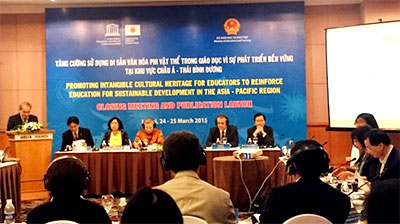Experts and educators gathered at a seminar in Ha Noi on March 24 to discuss how to include intangible cultural heritage in education for sustainable development in the Asia-Pacific region.

Organised by the Ministry of Education and Training (MOET), the Ministry of Culture, Sports and Tourism (MCST) and the UNESCO Office in Ha Noi, event participants included over 60 experts from 13 countries in the region.
Addressing the event, MOET Deputy Minister Nguyen Vinh Hien underscored the significance of cultural heritage in educating younger generations.
The MOET launched a campaign in 2009 to foster the teaching of folk music and traditional sporting practices in schools as well as motivate students to protect local historical and cultural heritage.
The MOET also worked with the MCST to publish a guideline on engaging school lessons with intangible cultural heritages in 2013, Hien said.
The same year, Viet Nam embarked as a pilot country for incorporating intangible cultural heritage into school curricula which has raised student awareness of and their sense of responsibility for such heritages, he added.
During the seminar, experts exchanged first-hand experience from the project in four pilot countries including Pakistan, Palau, Uzbekistan and Viet Nam over the past 2 years.
Head of the UNESCO Office in Ha Noi Katherine Muller-Marin noted that heritage education is a key driving factor for the formation of soft skills in a child, vital for sustainable development, including adaption, creativity, innovation, mutual respect and diversity.
Therefore, teachers need support to innovate teaching methods and inspire students to learn about and uphold the values of their unique cultural tradition, she stressed.
She also emphasised the importance of improving communication between schools, teachers, parents and the community towards effective heritage education.
Many provinces across the country have actively incorporated intangible cultural heritages into school lessons; Bac Ninh, Nghe An and Phu Tho province have campaigns to promote folk singing in schools and students in Lang Son province are taught traditional instrument playing.